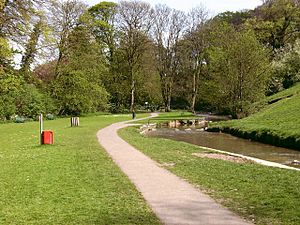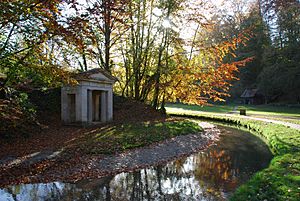Hubbard's Hills facts for kids
Hubbard's Hills is a lovely natural park located just west of Louth, in Lincolnshire, England. It's a popular spot for families to have picnics, for schools to go on field trips, and for people to walk their dogs. This special park was created to remember a woman named Annie Pahud.
How Hubbard's Hills Was Formed
Hubbard's Hills was shaped by powerful forces from the last Ice Age, about 40,000 years ago. Imagine a huge lake of melted ice, trapped between a giant ice sheet and the Lincolnshire Wolds. This water eventually spilled over a chalk ridge, carving out a deep, steep-sided valley. This valley is about 125-foot-deep (38 m)! The River Lud flows through the valley today, but it's much too small to have created such a large feature on its own.
The Story Behind Hubbard's Hills
Hubbard's Hills was given to the town of Louth by the people managing Auguste Alphonse Pahud's estate. It first opened to the public on August 1, 1907. Auguste Pahud was from Switzerland and moved to Louth in 1875. He became a German and French teacher at King Edward VI Grammar School.
Auguste married a local girl named Annie Grant. Her parents, William and Maria Grant, were wealthy farmers from Withern. Sadly, Annie Pahud passed away in 1889, and Auguste was very sad about it. He died in 1902.
The people in charge of Auguste Pahud's estate bought Hubbard's Hills. They wanted to fulfill his wish to create a memorial for Annie. They turned the area into a beautiful Edwardian pleasure garden with a lake, a country park, and a memorial. They made sure that the park's natural beauty and countryside feel would be kept forever.
In 2009, the responsibility for maintaining the park was given to the Hubbard's Hills Trust Limited. However, the park still belongs to the people of Louth, and the Town Council remains its official guardian. The Trust's job is to follow a special plan to protect the park for the next 100 years. This includes planting new trees, improving the chalk stream, and cleaning out the ornamental lake. Volunteers also help with clean-up efforts.
Gallery








